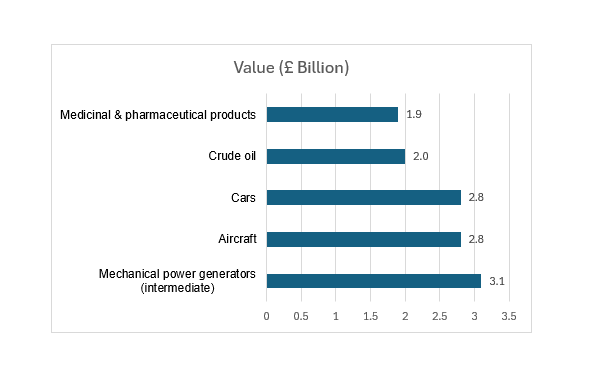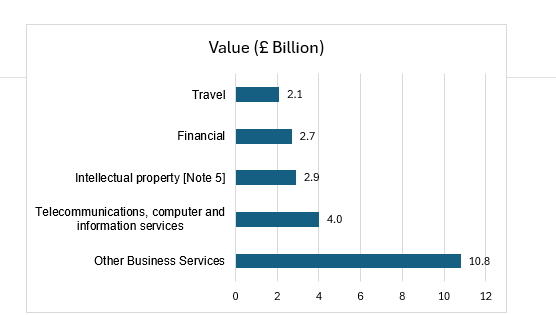Market Focus: Germany
Germany: Europe’s economic hub
One of the six founding members of the European Union, Germany has been one of the greatest advocates of the community and since its foundation, it has been a bastion for progressive and innovative businesses.
Germany is considered today the fourth largest economy in the world and the strongest in the European Community, with a GDP per capita estimated of $48,636 (IMF, 2022), which is forecasted to accelerate from 0.2% in 2023 to 1.4% in 2024.
An ever-growing economy who is constantly moving towards sustainable and progressive industries, it is not surprising that the market is a welcoming and safe space for innovative businesses.
Germany has already gained position as the second largest trading partner of goods and services for the UK (right behind the USA), taking a total of £61.1 billion imports from the UK by the end of Q2 2023, which represents a 6.9% of the total UK exports to nations worldwide.

Germany has an estimated population of 83.2 million inhabitants and a 99% literacy rate; Germany has in fact has the most non-native English speakers in all of Europe, with a 56% of the population speaking the English as a second language.
It doesn’t come as a surprise that Germany is currently the largest consumer market in Europe and therefore a territory full of endless opportunities to UK businesses looking for a stable overseas market where to expand.
The German territory shares borders with nine countries and counts with ten internationals inland, air and sea-ports, serving as an entry point into other European member states; it also has excellent road, rail and waterway links, which are all pivotal to intra-European trade.
Being the second strongest trade partner to the UK serves as evidence that the trading relationship between both markets is only growing stronger and that there are still opportunities available for UK businesses to grasp and benefit from.
Top 5 UK products exported to Germany:

Top 5 services exported to Germany:

The above data is taken from Department for Business and Trade.
A bastion of progressive and innovative businesses
Germany is known for the openness of their consumers but also for their demand of high-quality products and services, therefore, any business looking to enter this market must make quality and innovation their top priorities.
The country is a leading exporter of machinery, chemicals, and household equipment, and is the home to some of the most recognized and appreciated vehicle brands, such as BMW, Mercedes, Volkswagen and Audi, just to mention some.

A market economically stable, highly industrialised, innovation driven, and with a highly skilled workforce, Germany has great potential for development and offers British traders countless opportunities for long-term business growth.
Germany is also host to some of the largest international trade shows across all consumer and industry sectors, such as the “Hannover Messe” (Hannover Fair), a major arena to showcase and explore industry development, or the Berlin Fashion Week, for sustainable fashion.
The UK-EU Trade Agreement, which came into effect in January 2021, also plays an important role in the strengthening and growth of the relationship between the UK and Germany, as it removed major barriers to trade, barriers that would have otherwise affected UK businesses greatly. The Agreement covers not only the trade in goods and services, but also other areas of mutual interest, such as energy and sustainability, investment, transportation, data protection, social security, amongst others. However, one of the biggest benefits, or at least one of the most palpable to British exporters is that of the rules of origin agreed upon, as they enable importers in both territories to access preferential duty rates (from reduced to nil) to all complying commodities.
As a pioneer of the European Community, the German market welcomes businesses from all different industries and sectors who are interested in joining the countries efforts towards progress and innovation and offers in exchange a strong legal and economic framework, excel logistics infrastructure, competitive tax regulations and a highly qualified workforce. A market worth exploring and keeping track of for future business opportunities.
Like any other EU member state, Germany requires businesses to adapt and comply to their customs and industry rules and regulations, it is important therefore that any businesses looking to explore this market undertake thorough research of their industry and all sector specifics to ensure a successful business venture.
To this matter, the London Chamber can help companies access specialised overseas market information through our Business Information Services, available to Premier Plus Members. Our reports include:
- Overview of the country’s economy
- In-demand products and services from the UK
- Information on export and import procedures
- What to expect when doing business in the country
- UK and worldwide import and export data
Sources
This country snapshot was prepared with information compiled from the Office for National Statistics (Trade in Services, Trade in Goods), the Department for Business and Trade, Croner-i, Trading Economics, and History of English.
Produced by Elizabeth Skewes,Trade Services and Business Development Manager, LCCI.

